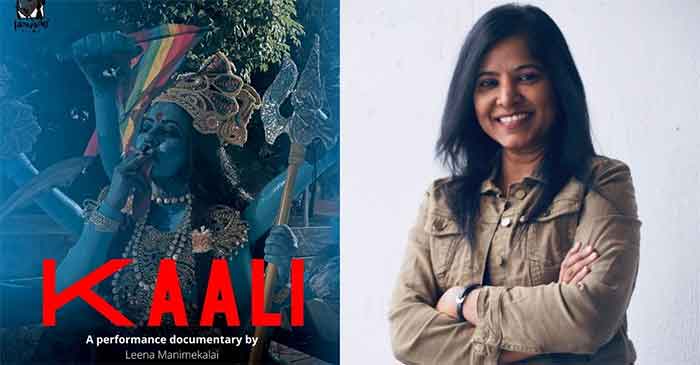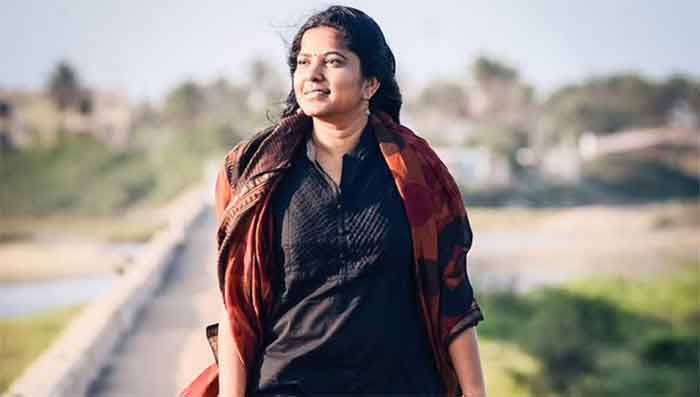
A large section of the Hindu Right and the Hindu-not-so-right are ready to quarter, slice and cook film maker Leena Manimakalai on a hot oven for using a poster of her documentary film Kaali as a smoking and smiling Goddess stating that this is a violation of Hindutva that tends to vilify the Hindu image of Kali in public space. Through this article, the author has tried to show how some of the greatest devotees of Goddess Kali from the field of music, have perceived Kali and expressed their thoughts through song and music quite in line with the filmmaker’s thought process.
Leena has told Voice of America, “My Kaali is queer. She is a free spirit. She spits at patriarchy. She dismantles Hindutva. She destroys capitalism. She embraces everyone with all her thousand hands.” In her statement to BBC, she said, that the goddess she shows in her film “champions humanity and embraces diversity. As a poet and filmmaker, I embody Kali in my own independent vision.”
Kaali was first screened during Rhythms of Canada, a week-long festival celebrating multiculturalism, at the Aga Khan Museum in Toronto earlier this year. Manimekalai, who belongs to Maharajapuram village in Tamil Nadu’s Virudhunagar, has internationally acclaimed films Madathi and Sengadal the Dead Sea to her credit.
Advocate Vineet Jindal filed a police complaint against the filmmaker over the post of her documentary as it shows Goddess Kali smoking a cigarette. According to Manimekalai, “the film revolves around events one evening, when Kali appears and strolls the streets of Toronto. If you see the picture, don’t put the hashtag ‘arrest Leena Manimekalai’ and put the hashtag ‘love you Leena Manimekalai’” read the filmmaker’s tweet, roughly translated from Tamil.
Another FIR was registered against her by the Uttar Pradesh Police for criminal conspiracy, offence in a place of worship, deliberately hurting religious sentiments, and intention to provoke breach of peace.A complaint was also filed with the Delhi Police for hurting the sentiments of the Hindu community.Most of the complainants demanded punishment against her by taking strict action under Section 295A of IPC, Section 79 of IT Act 2000 and Prohibition of Indecent Representation of Women Act, 1986.
Among famous poet-composers of Shyama Sangeet, a special musical genre dedicated exclusively to Kali are – Ramprasad, Kamalakanto, Rajanikanto Gupta, Girish Ghosh, Raja Ramkrishna, Shib Chandra and Kazi Nazrul Islam. These poetic and musical compositions spill over with the ‘nectar’ of spiritual life, exude a sense of exhilaration through their emotional fervour and are evocative of the deep love their composers have for the one they composed them for – the Goddess Kali.
The songs composed in devotion to goddess Kali are a fine blend of homely affection and pure devotion, which makes their appeal irresistible. People like Sadhak Kamalakanta, Gurudas Chakravarty, Kangal Harinath and Rasikchandra Roy through their compositions, have built bridges to reach the goddess of their hearts – Kali.
Ramprasad Sen (Kaviranjan) was born in a village called Kumarhatta, a place around 25 miles from Calcutta up the Hooghly River. The date of his birth is not certain but some sources trace it to 1723[i].
He landed the job of an accounts clerk in the office of a Bengali diwan or estate manager. He was a devotee of Kali from a tender age so he used most of the time writing poems dedicated to Kali in his account books. In his songs, instead of placing Kali in the high altar she is positioned in, Ramprasad brought her down to the level of the human being. In so doing, he could demystify Kali by domesticating her and thereby stripping her of the aura of godliness and fear she is surrounded by. In other words, he attempted to narrow the distance between Kali and her devotee by converting the relationship between the two to one of mother and son, or in a bolder way, turning himself – the devotee into a ‘devourer’ of the goddess.
Contrary to common expectations, people liked this unique approach towards the Goddess and were deeply influenced by the spirit of the compositions. Placing himself as the ‘devourer’ of his favourite Goddess, Ramprasad writes:
Ebar Kali tomayekhabo
Ebartumi khao ki amikhai Ma,
Dutorektakoreyjabo
DakiniJoginiduto, tarkaribanayekhabo,
Tomarmundo mala kereyniye
Ambale sambhar charabo.[ii]
(Translation: Now I shall devour you Kali. I shall now finally choose between the two – whether you will devour me, or whether I will devour you. I will make a vegetable curry of your two companions Dakini and Jogini. I shall snatch away your garland of skulls and use it to season a sweet-and-sour sauce.)
Interestingly, the first line of this song was used with great commercial success and popularity in a film starring the famous star-pair of Uttam Kumar and Suchitra Sen called Saptapadi(1961) based on an original novel by the noted Bengali litterateur, Tarasankar Bandopadhyay.
The song is used to take pot-shots at an Anglo-Indian girl who is proud of her ‘British’ antecedents and looks down on the Bengali Hindu male students of the local medical college. In retaliation, the Bengali hero Krishnendu, teases her with this song, stressing on the two words ‘Kali’and “khabo.” The first line of this famous Ramprasadi number is used in a sarcastic way to suggest patriotism and love for one’s ethnic identity as against the so-called ‘pride’ of the mixed breed the Anglo-Indians belonged to. The song remains a hot favourite till this day. But few are aware of its Ramprasadi roots. Strangely, no one took any objection to the use of this song teasing Kali, used by the Hindu hero Krishnendu (Uttam Kumar) poking fun at the Anglo-Indian nursing student Rina Brown (Suchitra Sen) in the song-dance number.
Sumanta Banerjee underlines Ramprasad’s stress on the nakedness of Kali.[iii] He calls this a rather ambivalent, erotic approach whereby the poet-saint often uses the Bengali colloquial term langta evoking a sense of the body in the raw, warts and all, but intimate and inviting in its sensual and sexual nakedness, different from the Sanskritized chaste term nagna or nagnika, which would correspond to the English word ‘nude’, implying a more elegant, distant but inaccessible female form.[iv] One example of this irreverence is:
Kali go keno langtaphero
ChhiChhikichulajjaneitomar
Apnilangta, patilangta
Ma go, amra sabe mori laje.[v]
(Translation: Kali, what makes you romp around naked? Fie on you! Don’t you have any shame?You are naked, so is your husband…Dear Mother, you make us all die of shame.)
Banerjee offers an interesting analysis of Ramprasad’s psychology of mysticism. He questions Ramprasad’s ambivalence towards Kali tracing it back to the ambivalence that marks the Shakta cult, born from the ‘illegitimate’ union of aboriginal customs and Brahmanical ideology, perhaps the obvious outcome of Ramprasad himself coming of an upper-caste, Hindu family. “While acknowledging the omnipotent mother-goddess, attracted by the traditional concept of the all-powerful Adya-Shakti, was he also torn between his total devotion to Kali and the impulse to completely submit to a goddess, and social prejudices about the position of women in his society, an inherited repulsion for the assertive and self-willed woman?”[vi]
In a completely different interpretation, Sukumar Sen writes: “But this melody and the songs pertaining to it may have been the work of another Ramprasad (a Brahmin) belonging to Calcutta who was reputed as a composer of ‘Kabi’ songs. This Ramprasad was a younger contemporary (?) of the first who was a Vaidya.”[vii] This statement remains unverified by history.
No further debate on the originality of Ramprasad’s devotional compositions has been found. He continues to be revered as a poet-saint whose life story is filled with legendary anecdotes of his having had several visions of Kali in person. Ramprasad continued to be revered as a poet-saint whose life story is filled with legendary anecdotes of his having had several visions of Kali, the Mother Goddess, in person[viii].
These songs composed by the famous Kali devotees known as Shyama Sangeet are varied and colourful in their descriptions. Some songs are elaborate descriptions of her physical and inner beauty; some songs are repeated chants of the different names she is known by; some songs are explorations into the mystique of Kali; some songs carry the essence of Tantric philosophy and thought, while there are songs that talk about the collective power of the universe as expressed and reflected through Kali.
So, trying to hang Leena Manimakalai to metaphorical death is not only an exercise in futility but it also betrays the complete ignorance among the self-appointed Hindutva crusaders across the county about Kali, the Black Goddess and her place in music, song and literature.
All too often, we hesitate to step into a humanized world free of people divided on the basis of birth, colour, sex and money. In some twisted way, wittingly or unwittingly, Kali finds herself in the centre of controversy. Every single one of our reformist and rebellious movements have aimed at fairness and justice for all, a fight for one’s rights, a demand for equality for all humans – much in line with our presiding Goddess Kali. Kali has woven herself into the identity of the Indian generally and Bengali specifically, at times so subtly that one does not recognize the presence; at other times, the recognition is so pronounced that it takes the newcomer/outsider by surprise, or shock, or both. Between these two extremes, are the varied shades of grey in all their manifestations.
Shoma A. Chatterji is a freelance journalist, film scholar and author contributing to several digital and print media in India and beyond. She has authored 27 books and two more are in the pipeline. She has won the National Award for Best Writing on Cinema twice. She lives in Kolkata.
[i] Elizabeth U. Harding: Kali- The Black Goddess of Dakshineswar, Motilal Banarsidass Publishers Private Limited, Delhi, 1998,p.215.
[ii]DurgadasLahiri (ed.) BangalirGaan, (Bengali), Calcutta, 1905,p.6.
[iii]Sumanta Banerjee: “The Changing Role of Kali” in Logic in a Popular Form – Essays on PopularReligion in Bengal, Seagull Books, Calcutta, 2002,p.52-53.
[iv]Ibid.p.53.
[v]DurgadasLahiri (ed.) BangalirGaan, (Bengali), Calcutta, 1905,p.28.
[vi]Sumanta Banerjee, Ibid.p.53.
[vii]Dr. Sukumar Sen, Ibid.p.154.
[viii] Elizabeth U. Harding, Ibid,pp.224-227.












































